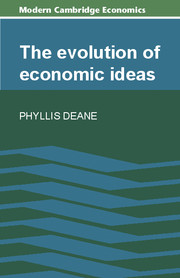Book contents
- Frontmatter
- Series preface
- Contents
- Introduction
- 1 Origins of modern economics
- 2 Adam Smith's theory of value
- 3 Origins of modern growth theory
- 4 Classical monetary theory
- 5 Ricardo on value, distribution and growth
- 6 Scope and methodology of classical political economy
- 7 The marginal revolution and the neo-classical triumph
- 8 The neo-classical theory of value
- 9 The Marxian alternative
- 10 Neo-classical orthodoxy in the inter-war period
- 11 Monetary theory in the neo-classical era
- 12 The Keynesian revolution
- 13 Twentieth-century growth theory
- 14 Methodological divisions in economics since Keynes
- Index of names
- Subject index
1 - Origins of modern economics
Published online by Cambridge University Press: 05 June 2012
- Frontmatter
- Series preface
- Contents
- Introduction
- 1 Origins of modern economics
- 2 Adam Smith's theory of value
- 3 Origins of modern growth theory
- 4 Classical monetary theory
- 5 Ricardo on value, distribution and growth
- 6 Scope and methodology of classical political economy
- 7 The marginal revolution and the neo-classical triumph
- 8 The neo-classical theory of value
- 9 The Marxian alternative
- 10 Neo-classical orthodoxy in the inter-war period
- 11 Monetary theory in the neo-classical era
- 12 The Keynesian revolution
- 13 Twentieth-century growth theory
- 14 Methodological divisions in economics since Keynes
- Index of names
- Subject index
Summary
Ideas have been developed about economics – economic concepts and theories that might seem familiar to the students of twentieth-century textbooks – longer probably than written records survive to attest. Schumpeter, for example, refers to Kung Fu Tse (i.e. Confucius 551–478 b.c.) and Meng Tzu (372–288 b.c.) ‘from whose works it is possible to compile a comprehensive system of economic policy’ and who used ‘methods of monetary management and of exchange control that seem to presuppose a certain amount of analysis’. The standard histories of economic thought generally begin with references to Plato and Aristotle (sometimes also to the Old Testament) before launching into a discussion of theories of the just price: and it has become conventional to divide the history of western economic thought into four distinctive epochs:
(1) Classical Greek; the ideas of this period have come down to us embedded in political philosophy focused on the ethical problems of the aristocratic slave-based city-state.
(2) Mediaeval scholastic; in this period scholarship was a clerical monopoly and medieval economic ideas are to be found in essentially theological treatises where the focus of interest was moral rather than political and acquisitive motives were regarded as inherently disreputable. The scholastic discussions of the practice of usury, for example, or of a just price, were often concerned with deriving moral precepts of individual economic behaviour relevant to the context of a market economy, rather than with explaining the way the exchange economy actually worked, or ought to work.
- Type
- Chapter
- Information
- The Evolution of Economic Ideas , pp. 1 - 18Publisher: Cambridge University PressPrint publication year: 1978

